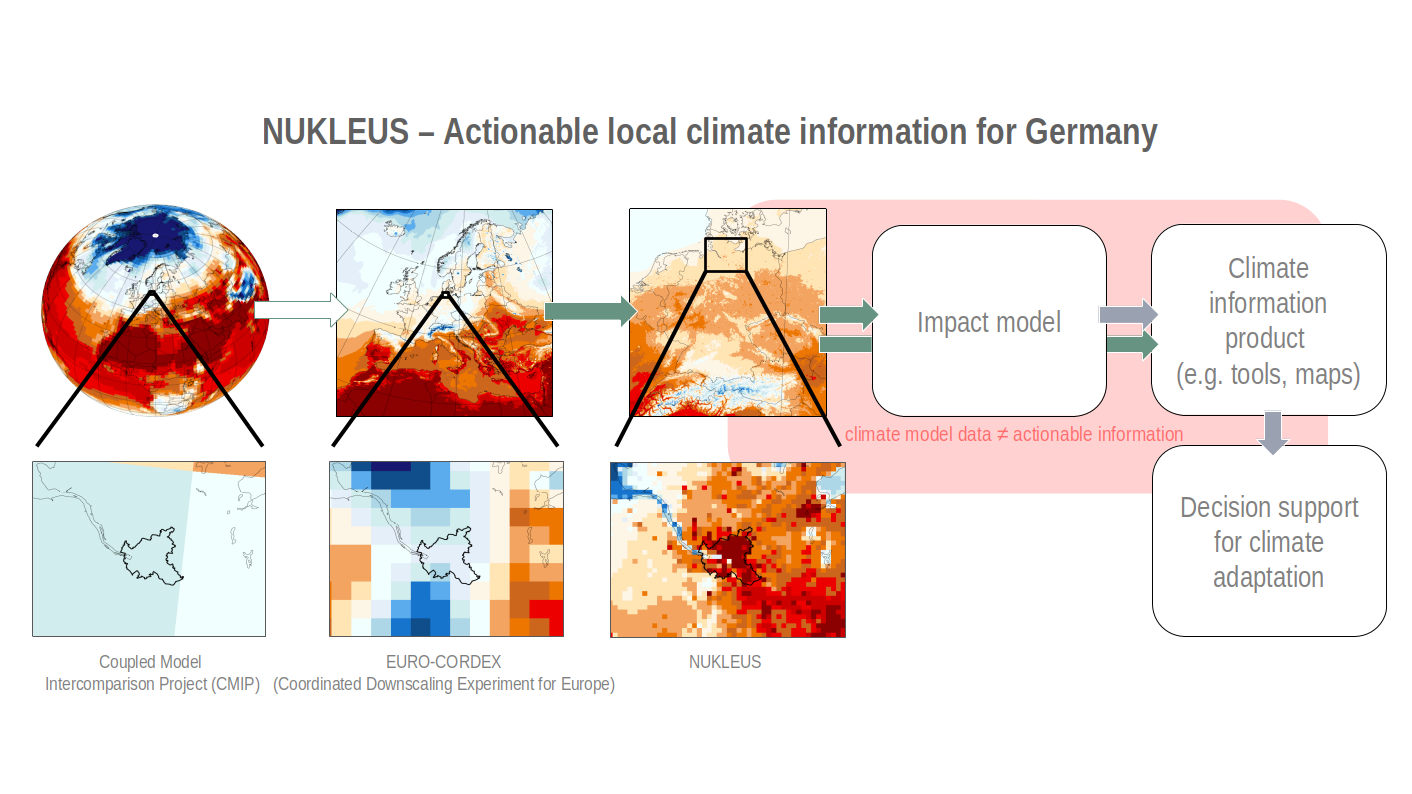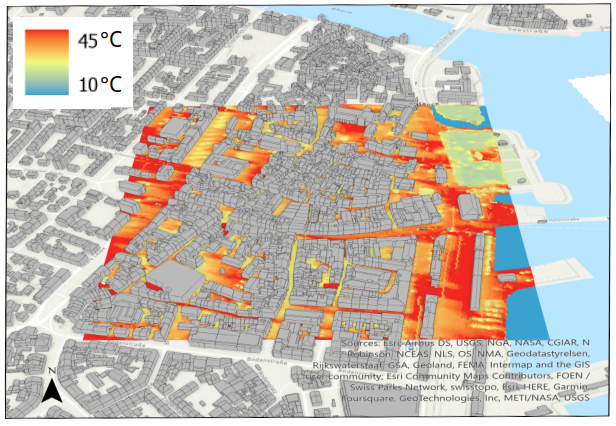Here, we discover how Climate Service Center Germany (GERICS) develops next-generation climate services from the regional to local scale
The EU aims to transform 150 European regions and cities into sustainable and climate-resilient areas by 2030.
Supporting local city officials to adapt to climate change
Many extreme events across the globe in the past years demonstrate the impacts of climate change across sectors, but especially at the local level. Hence, regional and local city officials are challenged with a pressing need to identify risks, plan, and implement efficient adaptation measures.
To identify future exposure, vulnerability and plan appropriate measures, climate data (including climate model and observational data) needs to be combined with socio- economic and the respective local geographical data (e.g., on topography or land use).
While various climate information is accessible, there is a recognised need for utilising and incorporating this information into administrative decision-making. Therefore, climate services need to focus on how climate services can move from useful to usable to being used by understanding the decision-making processes in which municipal users apply those data (Findlater et al., 2021; Hewit et al., 2020).
Furthermore, climate services must integrate different strands of data (climate, socio-economic, and geo-data) so city officials can identify their vulnerabilities and plan adaptation measures. The two issues are addressed in the BMBF funding measure RegIKlim and the BMVI-funded project CoKLIMAx. GERICS contributes as a scientific partner in both.

New high-resolution projection data potential
Given today’s climate science developments, providing climate information at the kilometer scale derived from convection-permitting climate simulations becomes increasingly feasible. Besides the pure technical feasibility of kilometer-scale simulations, they come with several advantages in terms of the representation of physical processes (e.g., Prein2015, Soares2022). (1,2)
This progress means many users can directly feed high-resolution climate information into their impact-models for climate impact studies at the local scale. Within the funding measure, RegIKlim, the NUKLEUS (Actionable local climate information for Germany) project will not only provide the first multi-model multi-decadal ensemble of simulations at convection-permitting resolution for Germany, but also co-develop interfaces between climate and impact models.
Ultimately, NUKLEUS aims at identifying and tackling technical barriers to facilitate access, handling, and combination of various adaptation-relevant data sets (e.g., climate data, socio-economic data, geo data) for impact modellers and adaptation managers. The work in NUKLEUS will result in a prototype of a web-based climate change information platform based on regularly updated scientific data for Germany in 2026.
High-resolution temperature information is also a need articulated by the stakeholders in the CoKLIMAx project. Within the project, heat events are simulated with the urban climate model Palm4U and hot spots within the area of interest up to a horizontal resolution of ~1m are identified.
This micro-scale information on heat stress not only contributes to the planning of effective adaptation measures in the city, but could also be a guiding tool for urban development, such as new construction projects or redensification efforts.

Over the last few years, a wide range of climate and projection data has become available. Practitioners, such as climate adaptation managers of cities, are encouraged to use the data within urban planning processes to plan and implement efficient climate mitigation and adaptation measures.
However, climate information and its presentation can be improved as many officials are unaware of how to find and apply appropriate climate services (Hoffmann et al., 2020). Surveying 72 officials in Konstanz, 84.7% of the participants confirmed that the relevance of climate data for urban planning is increasing.
The findings underscored the significant promise of climate data and information in supporting adaptation activities. Nonetheless, evaluating data management capacities revealed substantial challenges, particularly in incorporating climate data into existing work procedures (Harrs et al., under review).
One of the biggest challenges is related to interfaces and data formats. Users often need support deciding what portal or dataset suits their specific needs and how to deal with large data quantities. A user-friendly tool for decision support has the potential to mitigate the difficulties associated with interacting with data and simplify its integration into the provision of public services.
Plus, a lack of clear roles and responsibilities and inadequate mainstreaming of climate adaptation hamper present municipal adaptation planning. Climate services need to incorporate this mainstreaming issue.
A checklist or a strategy outlining the distinct stages each department should follow while also recommending data for planning a measure could be of great support. Hence, respective tools should be able to develop technical capacities, e.g., on how to access and interpret data, foster collaboration between departments and offer interpretation guidelines for the provided data.
Next-generation climate services
Next-generation climate services integrate different strands of data better to reflect the systemic character of a region or city. Such a holistic understanding of the natural and social systems underlying climate change adaptation generates more practice-oriented value for users.
The approaches outlined here are the first steps towards more complex modelling systems with digital twins as a final destination.
References
- Prein, Andreas F. and Langhans, Wolfgang and Fosser,
Giorgia and Ferrone, Andrew and Ban, Nikolina and Goergen, Klaus and Keller, Michael and Tölle, Merja and Gutjahr, Oliver and Feser, Frauke and Brisson, Erwan and Kollet, Stefan and Schmidli, Juerg and van Lipzig, Nicole P. M. and Leung, Ruby}, A review on regional convection-permitting climate modeling: Demonstrations, prospects, and challenges, 2015, Reviews of Geophysics 2 vol. 53, pp. 323-361, https://doi.org/10.1002/2014RG000475, https://agupubs.onlinelibrary.wiley.com/doi/pdf/10.1002/ 2014RG000475 - Soares, P. M. M. and Careto, J. A. M. and Cardoso, Rita M. and Goergen, Klaus and Katragkou, Eleni and Sobolowski, Stefan and Coppola, Erika and Ban, Nikolina and Belušić, Danijel and Berthou, Ségolène and Caillaud, Cécile and Dobler, Andreas and Hodnebrog, Øivind and Kartsios, Stergios and Lenderink, Geert and Lorenz, T. and Milovac, Josipa and Feldmann, Hendrik and Pichelli, Emanuela and Truhetz, Heimo and Demory, Marie Estelle and de Vries, Hylke and Warrach-Sagi, Kirsten and Keuler, Klaus and Raffa, Mario and Tölle, Merja and Sieck, Kevin and Bastin, Sophie}, The added value of km-scale simulations to describe temperature over complex orography: the CORDEX FPS-Convection multi-model ensemble runs over the Alps, 2022, Climate Dynamics, December, https://doi.org/10.1007/s00382-022-06593-7, ISSN 1432-0894.
- Findlater, K., Webber, S., Kandlikar, M., & Donner, S. (2021). Climate services promise better decisions but mainly focus on better data. Nature Climate Change, 11(9), 731-737. https://doi:10.1038/s41558-021-01125-3
- Hewitt, C. D., Stone, R. C., & Tait, A. B. (2017). Improving the use of climate information in decision-making. Nature Climate Change, 7(9), 614-616. https://doi:10.1038/nclimate3378
- Hoffmann, E., Rupp, J., Sander, K. (2020). What Do Users Expect from Climate Adaptation Services? Developing an Information Platform Based on User Surveys. In: Leal Filho, W., Jacob, D. (eds) Handbook of Climate Services. Climate Change Management. Springer, Cham. https://doi.org/10.1007/978-3-030-36875-3_7
- Harrs, J.; Reinhart, V.; Vögt, V.; Scheib, P.; Tewes, T.; Pohl, T. Integrating climate information into municipal services: An empirical analysis of climate change adaptation in the city of Constance. 2023, jan-albrecht.harrs@hereon.de, Climate Service Center Germany (GERICS), Helmholtz- Zentrum Hereon, 20095 Hamburg, Germany. Manuscript submitted.


